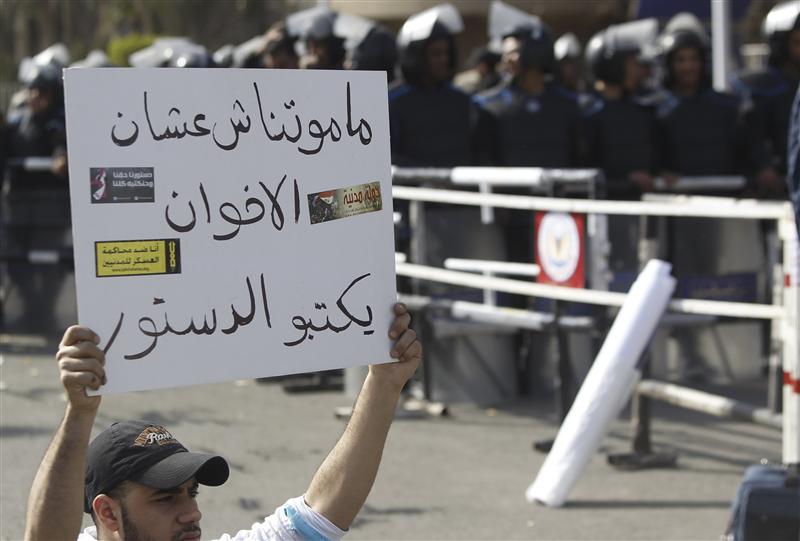Latest NEWS
- Aswat Masriya, the last word
- Roundup of Egypt's press headlines on March 15, 2017
- Roundup of Egypt's press headlines on March 14, 2017
- Former Egyptian President Hosni Mubarak to be released: lawyer
- Roundup of Egypt's press headlines on March 13, 2017
- Egypt's capital set to grow by half a million in 2017
- Egypt's wheat reserves to double with start of harvest -supply min
- Roundup of Egypt's press headlines on March 12, 2017
Timeline - Egypt since revolt against Hosni Mubarak

Protests against Islamist-led constituent assembly - Reuters
Here is a timeline of events in Egypt since protests against former President Hosni Mubarak began.
Jan. 25, 2011 - Anti-government protests begin across Egypt following the Jan. 14 overthrow of Tunisia's president in the first of a series of Arab uprisings.
Jan. 28 - Mubarak orders troops and tanks into cities to quell demonstrations. Thousands cheer at news of intervention of the army, which is widely seen as a neutral force in politics, unlike police who are regularly deployed to stifle dissent.
Jan. 31 - New government is sworn in. New vice-president, Omar Suleiman, hitherto intelligence chief, says Mubarak has asked him to start dialogue with political forces.
Feb. 4 - Thousands gather in Cairo's Tahrir Square in a "Day of Departure" to press Mubarak to go.
Feb. 10 - Mubarak says national dialogue under way, transfers powers to vice-president.
Feb. 11 - Mubarak steps down and a military council led by Field Marshal Mohamed Hussein takes over.
Feb. 22 - Tantawi swears in new cabinet but Muslim Brotherhood and others want it purged of Mubarak's ministers.
March 3 - Prime Minister Ahmed Shafiq resigns and military asks former Transport Minister Essam Sharaf to form cabinet.
March 19 - Big majority of Egyptians approves amendments to the constitution in referendum. The amendments are designed to pave way for parliamentary and presidential elections.
March 23 - Egypt approves law easing curbs that choked political life under Mubarak.
April 8 - Thousands protest in Tahrir Square against delays in putting Mubarak on trial.
Aug. 3 - Mubarak trial opens. Wheeled into a courtroom cage lying on a bed, Mubarak denies charges of ordering the killing protesters and other abuses of power.
Oct. 9/10 - Coptic Christians turn their fury on the army after at least 25 Christians are killed when troops break up a protest. Tension between Muslims and minority Christians is not new but has heightened since the anti-Mubarak revolt.
Nov. 18 - Thousands of people frustrated with military rule protest in Tahrir Square and in other cities. Three days later, Sharaf's cabinet resigns.
Nov. 22 - Tantawi promises that a civilian president will be elected in June 2012, six months sooner than planned. Tantawi confirms parliamentary elections will begin on Nov. 28.
Nov. 25 - Thousands demanding an end to military rule pack Tahrir Square in the biggest turnout of a week of protests and violence that cost 42 lives. The military council names Kamal Ganzouri to head a national salvation cabinet. He had served as prime minister under Mubarak from 1996 to 1999.
Nov. 28 - First voting in election for the lower house. The staggered election runs through January.
Dec. 23 - Thousands of Egyptians rally in Cairo and other cities to demand that the military give up power, and vent their anger after 17 people are killed in days of protests.
Dec. 30 - Egyptian police raid U.S.-backed pro-democracy groups, drawing criticism from Washington which hints it could review its annual $1.3 billion of military aid to Egypt.
Jan. 3-4, 2012 - Third and final round of election for the lower house. Muslim Brotherhood's Freedom and Justice Party takes more than two-fifths of the seats, followed by an ultra-orthodox Salafi Islamist party with more than a fifth.
Jan. 16 - Egypt says it has asked the IMF for $3.2 billion to help to fill a budget gap widened by almost a year of political and economic turmoil.
Jan. 23 - Lower house of parliament holds its first session. Voting for the upper house starts in February.
April 17 - Ten candidates are disqualified from the presidential race, including Mubarak's former spy chief Omar Suleiman and Muslim Brotherhood politician Khairat al-Shater. The Brotherhood fields reserve candidate Mohamed Mursi.
April 26 - Egypt's election committee says Ahmed Shafiq, Mubarak's last prime minister, can run for president after all, two days after it had disqualified him.
May 2 - Eleven people are killed in clashes between anti-army protesters and unidentified armed men. Clashes erupt again two days later and one soldier is killed.
May 23 and 24 - First round of presidential election.
May 28 - Election committee says the Brotherhood's Mursi and Shafiq will proceed to the second round of Egypt's first genuinely contested presidential vote on June 16 and 17. (Reporting by David Cutler, London Editorial Reference Unit;)










